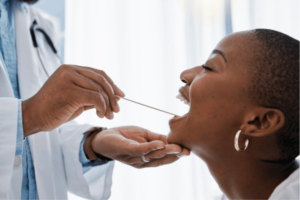
When you visit the dentist for a cleaning and checkup, there is a long list of things the dental assistant and dentist are looking at to determine your oral health. Not only are these appointments helpful for identifying gum disease and tooth decay in the earliest stages, but a checkup can also be beneficial for the early detection of oral cancer. In fact, it’s common for an oral cancer screening to be included in every routine examination.
Do you need an oral cancer screening? Are you at risk of developing this type of cancer? Each patient is unique, but there are a few standard recommendations for oral cancer screenings based on the patient’s age. The good news is that you don’t have to visit a special oral cancer screening dentist because most general dentists have experience with oral cancer. They know what to look for and are proactive about searching for these potential issues during your routine dental examination.
What Is the Screening Protocol for Oral Cancer?
Specific protocols are followed during an oral cancer screening. Dentists receive this training as part of their education, and dental hygienists are also trained to recognize the signs of oral cancer.
During an oral cancer screening, the dentist closely examines the patient’s throat and mouth. A mirror, light, and tongue depressor are used to see everything that is happening. The purpose is to identify any potential abnormalities in the tissue, such as discoloration, bumps, swelling, and/or ulcerations.
A thorough oral cancer screening includes an examination of the mouth, including the inner cheeks, the roof of the mouth, tonsils, tongue, and gums. Additionally, there is a check of the neck, jaw, under the chin, and the outside of the cheeks to see if any firm nodules or masses are present.
In addition to visits with an oral cancer screening dentist, you can also conduct a monthly self-examination at home to see if you notice any changes, lumps, white patches, or tissue that looks unusual.
Tests for Potential Oral Cancer
If the dentist identifies any potential abnormalities, additional tests can be done to evaluate the area further. Typically, a general dentist will refer a patient to meet with an oral cancer specialist.
These additional tests might use a light or special dye to see how the cancerous tissue differs from normal tissue. The specific test depends on where the spot is located in the mouth and the overall appearance of the growth.
Do Dentists Routinely Check for Oral Cancer?
Yes, it is a routine part of a dental examination to check for oral cancer. Typically, patients don’t need to request this service because it is included in the general dental examination and cleaning. If you are wondering about this checkup, talk to your oral cancer screening dentist for more information.
What Age Should You Get Screened for Mouth Cancer?
The typical recommendation is that adults over the age of 20 should start having oral cancer screenings every three years. It is recommended that individuals above the age of 40 undergo an annual oral cancer screening to ensure their oral health and detect any potential abnormalities.
But there are situations when oral cancer screenings are recommended more frequently. For example, if you have a risk factor that increases the likelihood of oral cancer, you might need to have these screenings more frequently. Talk to your dentist for personalized recommendations. Common risk factors might include:
- Family history of cancer
- You have human papillomavirus (HPV)
- Regular tobacco use
With oral cancer screenings being effortlessly painless, there is no reason to postpone a checkup that ensures your well-being.
How Long Does Oral Cancer Take to Develop?
The rate at which oral cancer spreads depends on the type of cancer. Most oral cancers take months or even years to spread. In fact, there are situations where a patient might live with oral cancer for an extended time without realizing it because the symptoms aren’t noticeable. So, just because you feel okay doesn’t necessarily mean you are cancer-free. It’s important to schedule regular cancer screenings as a preventive approach to ensuring your health.
On the other hand, certain types of oral cancer (such as squamous cell carcinoma) spreads rapidly. This type of cancer might spread in just a few weeks or months.
Oral cancer is like many other types of cancer: it responds best to early intervention. So, having regular checkups is the ideal solution to ensure that potential cancer is caught as soon as possible.
How Often Should You Get an Oral Cancer Screening?
Now that you understand the importance of oral cancer screenings, you might wonder: how often should you have an oral cancer screening? Keep in mind that regular oral cancer screenings are best in order to identify potential issues in the earliest stages.
The frequency depends on your age and medical history. Engage in a conversation with your dentist regarding the optimal schedule for oral cancer screenings if you haven’t undergone one recently.
If it’s time for an oral cancer screening, we invite you to contact our experienced team at myDental. We will gladly schedule an appointment for a routine examination that includes an oral cancer screening as well.
Do you have questions about protecting your teeth from decay and gum disease? Learn more about our preventive dentistry services. Call at your convenience to learn about available services. We offer multiple locations for your convenience. Reach out any time to see how we can help your family maintain healthy, beautiful smiles.